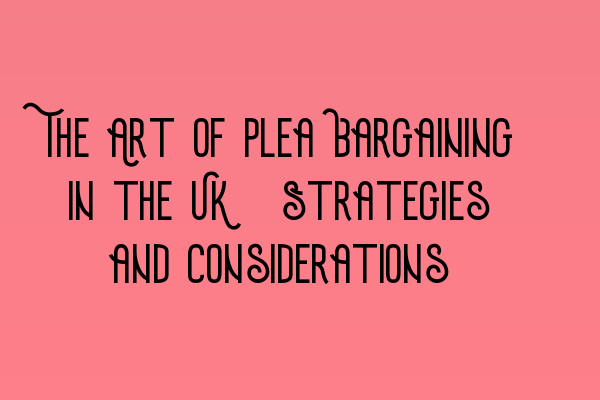The Art of Plea Bargaining in the UK: Strategies and Considerations
As a criminal defence solicitor, one of the most crucial skills you need to possess is the art of plea bargaining. Plea bargaining is a negotiation process between the defendant and the prosecution, where the defendant agrees to plead guilty in exchange for a reduced sentence or a lesser charge. It is a strategic approach that requires careful consideration and a deep understanding of the UK criminal justice system.
At SQE Criminal Law & Practice Law UK, we understand the importance of effective plea bargaining in achieving the best possible outcome for your clients. In this article, we will discuss the strategies and considerations that can help you master the art of plea bargaining.
1. Thorough Case Assessment and Preparation
Before engaging in any plea bargaining negotiations, it is essential to conduct a thorough assessment of your client’s case. This involves examining the evidence, identifying any potential weaknesses, and understanding the strengths of the prosecution’s case. By understanding your client’s position in the case, you can determine the scope for negotiating a favourable plea deal.
Our workshops and seminars on criminal practice provide valuable insights and guidance on conducting a comprehensive case assessment that will better equip you to engage in fruitful plea negotiations.
2. Building Rapport with Prosecution
In order for plea negotiations to be successful, it is crucial to establish a professional rapport with the prosecution. Building a positive relationship with the prosecution can foster open communication and facilitate meaningful negotiations. Developing mutual trust and respect can go a long way in reaching a beneficial outcome for your client.
To enhance your SQE criminal law study group experience, we recommend exploring our article on enhancing your SQE Criminal Law study group experience. This article provides valuable tips on networking and building relationships within the legal community.
3. Identifying Mitigating Factors
When engaging in plea negotiations, it is essential to identify and emphasize any mitigating factors that may exist in your client’s case. Mitigating factors are circumstances that may influence the severity of the sentence imposed by the court. These factors include remorse, cooperation with authorities, lack of previous criminal record, and other relevant considerations.
An in-depth understanding of the UK criminal justice system and criminal evidence rules is vital for identifying and presenting mitigating factors effectively. You may find our article on decoding criminal evidence rules helpful for gaining a detailed analysis of the rules governing criminal evidence.
4. Assessing the Strength of the Prosecution’s Case
As a solicitor, it is crucial to critically evaluate the strength of the prosecution’s case before considering plea negotiations. By assessing the evidence, witness statements, and any potential weaknesses in the case against your client, you can determine the likelihood of a successful defence at trial. This assessment will enable you to negotiate from a position of strength and maximize the benefits for your client.
For a closer look at state prosecution in the UK and gaining insights into the strategies employed by the prosecution, we recommend reading our article on public prosecutions in the UK.
5. Exploring Alternatives to Trial
Plea bargaining is often an attractive option for both the defendant and the prosecution as it offers a way to avoid the uncertainties and costs associated with trial. However, it is essential to consider alternative resolutions to a criminal case, such as diversion programs and restorative justice, when negotiating with the prosecution. These alternatives can provide a more rehabilitative approach, emphasizing the offender’s reform rather than solely focusing on punitive measures.
To gain an inside look into UK police procedures in criminal cases, we invite you to read our informative article on uncovering UK police procedures. Understanding the intricacies of police investigations can provide valuable insights when exploring alternatives to trial.
Conclusion
The art of plea bargaining requires a combination of legal expertise, negotiation skills, and a deep understanding of the UK criminal justice system. By conducting a thorough case assessment, building rapport with the prosecution, identifying mitigating factors, assessing the strength of the prosecution’s case, and exploring alternatives to trial, you can effectively navigate plea negotiations and secure the best possible outcome for your clients.
At SQE Criminal Law & Practice Law UK, we are committed to supporting legal professionals in their pursuit of excellence. Our workshops, seminars, and comprehensive articles provide valuable insights and guidance, expanding your expertise in criminal practice. Mastering the art of plea bargaining is a valuable skill that can make a significant difference in achieving favourable outcomes for your clients.
